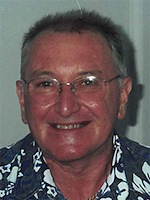When L F Ericson decided to divest itself of its Port Moresby office, the logical person to purchase it was the then manager, and so it was that Peter acquired the L F Ericson office in Port Moresby which he rebadged as “Connexions” retailing L F Erickson telephone plant and equipment, amongst other associated brands.
The business became very successful, as it had been taken over by Peter at the start of the mobile phone era.
Amongst his government clients, were included the Royal Papua New Guinea constabulary.
Peter got to know many of the senior officers and executives in that organisations, and they did not forget Peter and very kindly provided a police escort for his funeral cortege. Peter really settled in to Port Moresby and Papua New Guinea community and adopted Papua New Guinea as his new country of abode.
He married Ire Ire Olewale, the daughter of prominent New Guinea identity, the late Sir Ebia Olewale, a former Minister for Justice and subsequently Minister for Education and Commerce of the Independent State of Papua New Guinea. He and Sir Ebia became very good friends.
Peter very much immersed himself in Port Moresby’s civic and commercial life.
Indeed, his good friends Rio Fiocco (also his solicitor and the Estate solicitor) and Michael Mayberry (his accountant and the Foundation’s accountant) are Board members of the Foundation to this day.
Unfortunately, Peter’s relationship with Ire, whilst initially successful, eventually failed.
During 2003 and 2004, Peter’s health became a problem, almost at the same time as his business really started to do well. Around this time, his interest in music developed and he composed a number of songs.
Peter was extremely conscious that Papua New Guinea had been very kind to him and he wanted to give something back.
At that time, the education department had decided to impose a charge on attendance at government schools (which I believe has now in theory been removed). Peter had a very real concern that the parents who had come in from tribal areas living in squatter camps and who had not as yet adjusted to the cash economy, would be unable to afford to send their children to school. Accordingly, those children would not learn to read and write and speak English and be equipped to cope with the modern cash economy.
He feared that they would then provide ready recruits for the rascal gangs around Port Moresby.
He was also very good friends with the Chancellor of Goroka University and I can vividly remember sitting on his veranda overlooking Ella beach and talking about this problem and what could be done to alleviate it.
Peter wrote his own will, and in that will he directed that I ought to draft charitable trust to be established in his name:
“…As to the rest and residue of my estate, I leave to allow my executors to establish the “The O’Connor Foundation” (of which they may be the trustees if in their absolute discretion they deem it appropriate) in order to provide scholarships for the education of needy children resident in rural areas of Papua New Guinea and the settlement camps surrounding Port Moresby…”
After provision was made for his children and his new partner Maggie Hova, the bulk of his estate was left to the Foundation.
I have prepared and executed a Charitable Trust in addition to the Foundation, and I hope that, through the funding of the Peter O’Connor School at Gerahu, helping the Christ Redeemer School at Nine Mile and the Alotau Primary School (for rural children) and the Ginigoada Trade Training through the Chamber of Commerce, we have adequately achieved and catered for Peter’s wishes and concerns.

